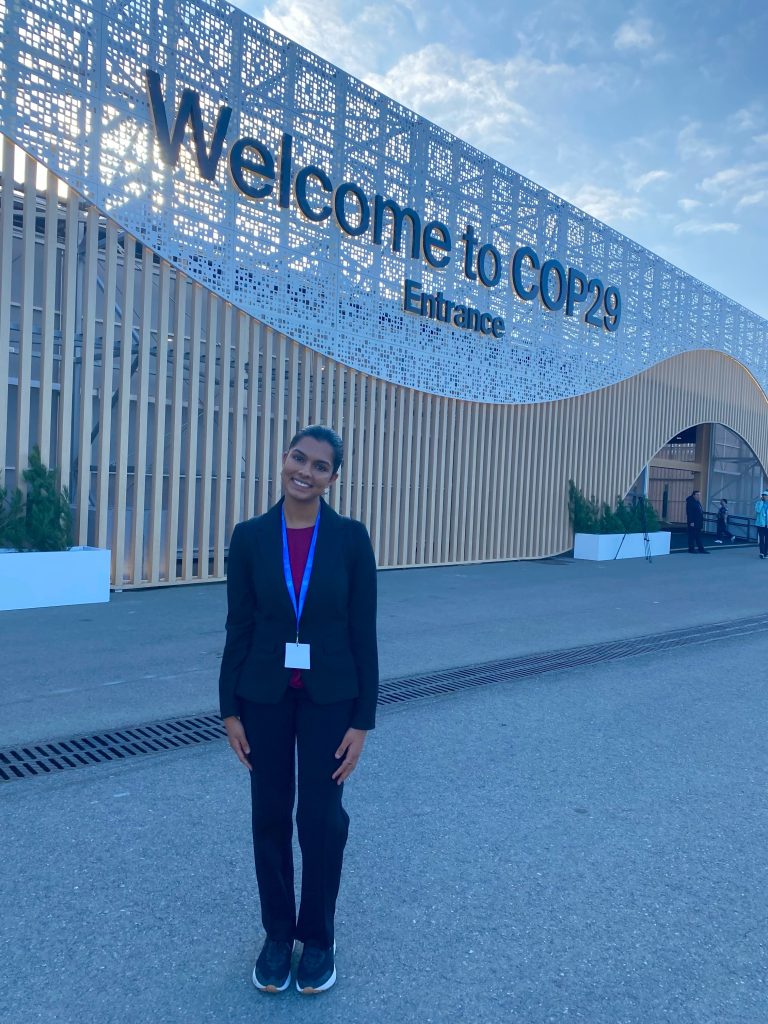COP29 convened last November in Baku, Azerbaijan, bringing together world leaders, policymakers, businesses, non-governmental organizations and civil society to negotiate global climate policies and advance efforts on mitigation and adaptation. As the world nears the 1.5° C warming threshold set by the Paris Agreement at COP21, and with climate disasters becoming a grim regularity, COP29’s stakes were extremely high, delivering outcomes that offered a mix of hope and hard realities.
Key Outcomes: Finance, Carbon Markets and the Global Climate Agenda
Among the key developments was the establishment of the New Collective Quantified Goal, which replaces the $100 billion annual climate finance pledge under the Paris Agreement. The NCQG aims to triple this commitment, with developed nations pledging at least $300 billion annually by 2035 to support sustainable development in developing countries. While promising, this funding goal still significantly lags behind the $1.3 trillion experts estimate is needed to truly move the needle.
Progress under Article 6 of the Paris Agreement, which governs international carbon markets, was another important outcome. At COP29, countries agreed on operational guidelines to enhance transparency and accountability in carbon credit trading, aiming to ensure genuine emissions reductions while unlocking significant climate finance from both nations and the private sector.
Meanwhile, discussions around Nationally Determined Contributions, countries’ self-determined climate action plans under the Paris Agreement, took center stage. The first “global stocktake” revealed that current NDCs fall short of limiting global warming to 1.5° C, underscoring the urgent need for stronger commitments in the next set of NDCs, due by February. While countries like the UK and Brazil presented promising updates at COP29 with ambitious carbon reduction targets, the absence of a new NDC from the United States, amid shifting political winds, casts uncertainty over the future of the global climate agenda.
Beyond Governments: How the Private Sector Can Lead the Climate Agenda
Here’s the reality: Waiting for governments to act is unlikely to be sufficient – especially when policy backtracking could undermine ambitious goals. It’s a sobering thought, but it also reveals a unique opportunity for the private sector to carry the torch for climate action. Companies have the distinct ability to drive innovation, mobilize resources at scale and profoundly influence global supply chains. They must proactively shape the climate agenda by championing collaboration and committing sustainability as a core value.
Through collaborative spaces and dynamic conversations at COP29, businesses of all sizes, from small startups to multinational corporations, showcased innovative ways to tackle climate challenges. Here are the key takeaways I observed from these efforts, including how we, as individuals, can contribute to driving meaningful change within these organizations and beyond.
Scaling Impact Through Industry Collaboration
Sustainability should no longer be viewed as a competitive advantage – it must be the baseline, a point of competitive parity that defines the way businesses operate. In an era where climate challenges demand systemic solutions, companies that embrace collaboration are not only driving greater impact but also unlocking new avenues for growth. Take Tony’s Chocolonely, for example. By open-sourcing its ethical cocoa supply chain through Tony’s Open Chain, the company is tackling labor exploitation industrywide, fostering stronger, more resilient supply chains. Similarly, Allbirds’ Invitation to Copy encourages competitors to adopt its sustainable materials and processes, drawing in industry giants like Adidas for collaborations that amplify change at scale. Allbirds has exemplified an innovative shift – moving away from proprietary technology models in sustainability doesn’t weaken a brand; it strengthens it by showcasing an authentic commitment to climate impact.
It’s clear that collaboration enables companies to build on each other’s successes, furthering ideas that no single organization could achieve alone while flattening the cost curve for sustainable technology development. It also frees businesses to compete where it matters most – providing differentiated value to customers through aspects such as quality, service and delivery – while ensuring sustainability is a shared foundation.
The Power of Diverse Voices: Driving Innovation and Global Relevance
Diverse and cross-generational perspectives are strategic imperatives for crafting solutions that are relevant, innovative and impactful. At COP29, Unilever Global Head of Sustainability Thomas Lingard highlighted how the company integrates fresh perspectives by inviting employees under 30 with less than five years of experience to participate in key sustainability discussions. This approach has injected long-term thinking into corporate strategy, enabling Unilever to announce ambitious decarbonization goals across its value chain over the next decade.
The young people I met at COP29 underscore why it is critical for businesses to seek diverse perspectives, even beyond organizational boundaries. Representing countries facing the harshest impacts of climate change – from island nations like Vanuatu, where rising sea levels and intensifying cyclones are displacing entire communities, to sub-Saharan Africa, where prolonged droughts are devastating livelihoods and fueling food insecurity – they spoke with urgency and clarity about the challenges their communities endure. Their desire to co-create solutions serves as a powerful reminder that businesses have a critical opportunity – and responsibility – to amplify these voices. The result? A deeper understanding of the nuanced needs of the regions that businesses serve and the ability to create solutions that resonate globally.
Investing in Regeneration: Broadening Horizons for Sustainability
Broadening the investment horizon means going beyond short-term sustainability targets to actively preserve the natural capital that supports long-term economic success. Natura &Co, a Brazilian multinational cosmetics corporation largely present at COP29, exemplifies this approach through its deep collaboration with over 7,000 Amazonian families. By integrating indigenous knowledge into product development and co-developing sustainable farming practices, Natura’s efforts protect biodiversity in the Amazon rainforest, support local livelihoods, and tell a powerful story to consumers – one of authenticity, ethical sourcing and profound respect for the communities at the heart of their supply chain.
Blended finance plays a critical role in scaling such nature-based solutions by pooling public, private and philanthropic funds to de-risk investments in high-impact projects. Organizations like the Global Environment Facility and the CFO Coalition for the SDGs provide excellent examples of how these models can unlock new capital for projects that prioritize ecological restoration and resilience. Simply put: Failing to prioritize regeneration poses material risks to long-term business profitability, especially for companies heavily relying on finite natural resources, making these collaborative funding mechanisms essential.
Maanya Rajesh ’26 was UNC-Chapel Hill’s youth representative at the 2024 United Nations climate conference, COP29.

A Personal Note: As a student with a deep interest in exploring the intersection of sustainability and business strategy and with a passion for climate justice, attending COP29 in the beautiful city of Baku was an extraordinary experience. I am immensely grateful for all that I learned and the inspiring people I met along the way. Special thanks to Dr. Angel Hsu for nominating me to attend and to the Morehead-Cain Foundation for funding this opportunity. I certainly look forward to participating in future COPs and continuing to contribute to meaningful climate action.
Additional Resources
We Mean Business Coalition at COP29
World Resources Institute: Pathways to Unblocking Private Financing for Nature-Based Solutions
- Keyword(s):
- climate change 20

On Site at COP29: Hope and Hard Realities